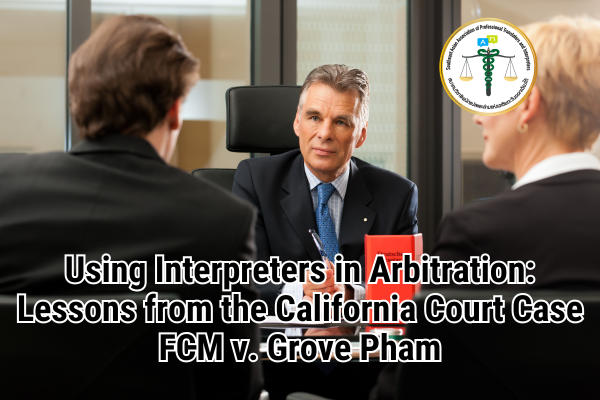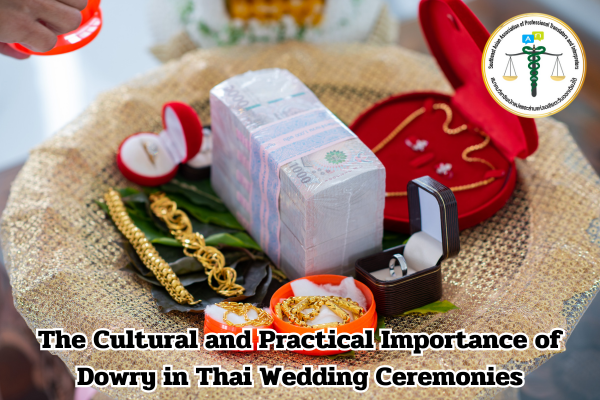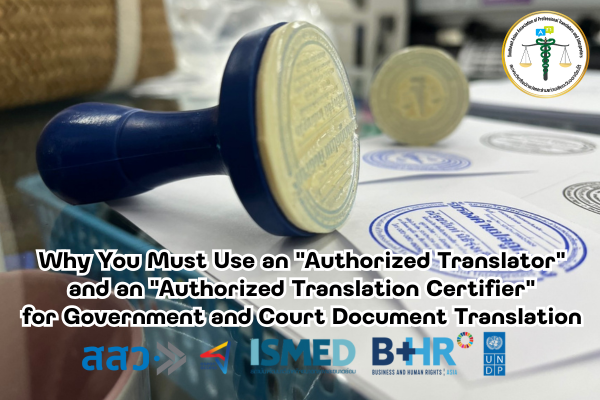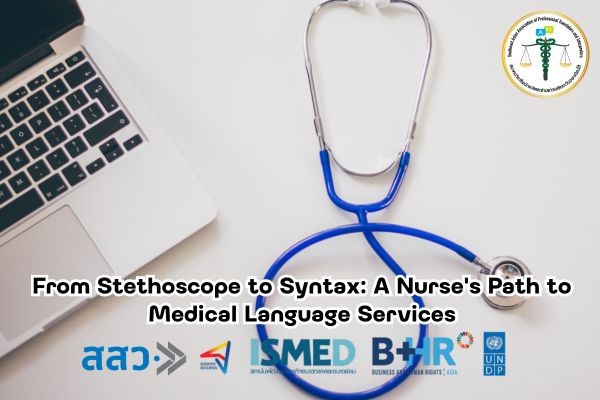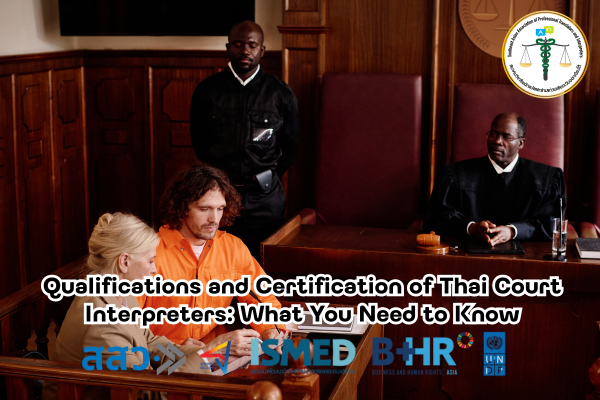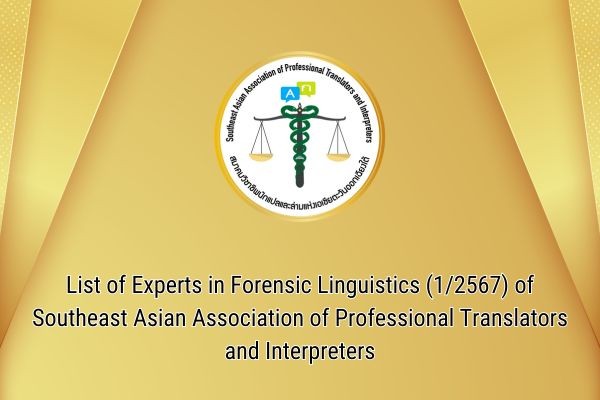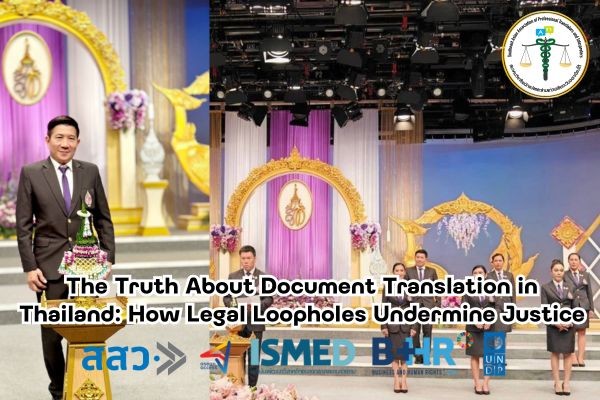Using Interpreters in Arbitration: Lessons from the California Court Case FCM v. Grove Pham
10 March 2025, Bangkok – Not too long ago, there was an interesting case called FCM Investments LLC v. Grove Pham LLC—or FCM v. Grove Pham for short. The California Court of Appeal, Fourth District, Division One, decided to throw out an arbitration decision because it seemed like the sole arbitrator might have been “biased” against one side who chose to testify with an interpreter. Even though this case happened in the U.S., the idea of using interpreters isn’t new to international arbitration, especially since English has become the go-to language for both dispute resolution and global business. There hasn’t been much formal study on interpreters in arbitration, but we can borrow ideas from how they’re used in courts. The lessons from this case and court research remind people in this field to be careful and smart when dealing with parties or witnesses who aren’t fluent in the arbitration language.
A Quick Look at the Case
FCM v. Grove Pham was about a real estate deal that fell apart between an investor and someone running a nursing home business. The arbitrator ruled that Grove Pham broke the contract, mainly based on how “trustworthy” the witnesses seemed. Specifically, the arbitrator thought Ms. Phuong Pham, the owner of Grove Pham, was using an interpreter to pretend she wasn’t as sharp as she really was. The arbitrator pointed to three things: 1) Pham had lived in California for decades, 2) she’d handled complex business deals, and 3) she’d “been an interpreter” before.
But the court reviewing this decision said the arbitrator got it wrong about language skills and might have been biased against Pham’s language or background. According to California law (Code of Civil Procedure Section 1286.2), if an arbitrator acts improperly and it hurts a party’s rights, the court can cancel the decision—especially if there’s a “feeling of possible bias.”
The court explained that living in the U.S. for years doesn’t mean someone’s fluent in English. They cited a Pew Research Center study showing 40% of immigrants in the U.S. don’t speak English very well. They also said that in places like “Little Saigon” in Orange County, where Pham ran her business, people can do well in business without being great at English because most customers speak their language. Plus, Pham wasn’t a certified interpreter, and the records weren’t clear on what “being an interpreter” meant—especially since she’d had her daughter translate phone calls with FCM before. In the end, the court saw a big chance of bias in the arbitrator’s short, four-page decision that focused almost entirely on witness trustworthiness, so they scrapped it.
Bias and Diversity: Things to Think About with Interpreters
People have talked before about how choosing a language in arbitration affects lawyers—like how picking English might carry cultural weight or how accents can lead to bias. But using interpreters is different; it’s tied to the language choice and mostly affects how witnesses are seen, not lawyers. Still, arbitrators need to watch out for bias—whether they mean it or not—when a witness uses an interpreter. In this case, the arbitrator didn’t see anything wrong with her take on Pham, which shows we need to help people understand why someone might need an interpreter. So, what rules should there be for using one? Arbitration hasn’t studied this much, but we can look at how courts handle it.
What Linguistics Says About Interpreters in Court
Experts like Philipp Sebastian Angermeyer say that testifying in a second language depends on two things: “everyday communication skills” (being able to chat based on context) and “language and concept skills” (understanding tricky stuff with little context). Basically, even if someone seems good at a second language, they might not know the words to talk about things outside their daily life. For example, a lawyer who uses a second language a lot might know legal terms, but a regular person who doesn’t testify often might not.
Research by Inbal Itzhak and her team also points out that some places have laws giving people the right to an interpreter in court—like Canada’s Canadian Charter of Rights and Freedoms (Section 14) or California’s Government Code Section 68092.1, which says courts have to provide interpreters for anyone who needs one and can’t judge their trustworthiness based on that. The FCM v. Grove Pham case backs up that bias against interpreter users is something we need to tackle.
Smart Ways to Handle Interpreters in Arbitration
Using interpreters can slow things down or mess up the flow of questioning. Like in this case, some might worry it’s a trick to gain an edge. But for some witnesses, it’s a must-have, and showing bias against it can get a decision thrown out, as happened here.
For lawyers figuring out if an interpreter is needed, think about whether the witness can handle everyday topics. If they can, maybe they don’t need one. But if it’s something complicated or outside their usual experience, an interpreter might help. One idea is to let the witness try speaking the arbitration language, with the interpreter stepping in only when they get stuck.
For arbitrators, the big takeaway is to catch yourself if you’re judging a witness for using an interpreter. This case shows that even a hint of bias can ruin a decision. In a field as diverse as international arbitration, dealing with bias is a top priority.
Wrapping Up
FCM v. Grove Pham tells us that people working in global arbitration need to watch out for bias—whether they realize it or not—toward witnesses who use interpreters. Sure, this case was in the U.S. and used local laws, but the issue pops up everywhere interpreters and laws like these are involved. Court studies give us some clues on how to handle it. In the end, like with any kind of bias, the goal in arbitration is to keep the process fair and trustworthy.
SEAProTI’s certified translators, translation certification providers, and certified interpreters:
The Southeast Asian Association of Professional Translators and Interpreters (SEAProTI) has officially announced the criteria and qualifications for individuals to register as “Certified Translators,” “Translation Certification Providers,” and “Certified Interpreters” under the association’s regulations. These guidelines are detailed in Sections 9 and 10 of the Royal Thai Government Gazette, issued by the Secretariat of the Cabinet under the Office of the Prime Minister of the Kingdom of Thailand, dated July 25, 2024, Volume 141, Part 66 Ng, Page 100.
To read the full publication, visit: the Royal Thai Government Gazette
การใช้ล่ามในการตัดสินข้อพิพาท: บทเรียนจากคดี FCM v. Grove Pham ในศาลแคลิฟอร์เนีย
10 มีนาคม 2568, กรุงเทพมหานคร – เมื่อไม่นานมานี้ มีคดีที่น่าสนใจชื่อ FCM Investments LLC v. Grove Pham LLC หรือที่เรียกสั้น ๆ ว่า FCM v. Grove Pham ศาลอุทธรณ์แคลิฟอร์เนีย เขตที่สี่ แผนกหนึ่ง ได้ตัดสินยกเลิกคำตัดสินของอนุญาโตตุลาการ (การไกล่เกลี่ยข้อพิพาทโดยคนกลาง) เพราะดูเหมือนว่าผู้ตัดสินคนเดียวมี “อคติ” ต่อฝ่ายหนึ่งที่เลือกใช้ล่ามตอนให้การ แม้ว่าคดีนี้จะเกิดขึ้นในสหรัฐฯ แต่เรื่องการใช้ล่ามก็ไม่ใช่เรื่องใหม่สำหรับวงการอนุญาโตตุลาการระหว่างประเทศ โดยเฉพาะเมื่อภาษาอังกฤษกลายเป็นภาษาหลักที่คนใช้กันทั้งในการตัดสินข้อพิพาทและธุรกิจทั่วโลก แม้จะยังไม่มีใครศึกษาเรื่องนี้อย่างจริงจังในวงการอนุญาโตตุลาการ แต่เราสามารถเอาแนวคิดจากการใช้ล่ามในศาลมาปรับใช้ได้ บทเรียนจากคดีนี้และงานวิจัยเกี่ยวกับล่ามในศาลเตือนใจคนที่ทำงานด้านนี้ว่า ต้องระวังและมีวิธีรับมือที่ดีเมื่อเจอกับคู่กรณีหรือพยานที่พูดภาษาของการตัดสินไม่คล่อง
เรื่องราวคร่าว ๆ ของคดี
คดี FCM v. Grove Pham เกี่ยวกับดีลซื้อขายอสังหาริมทรัพย์ที่ล่มไประหว่างนักลงทุนกับคนที่ทำธุรกิจบ้านพักคนชรา ผู้ตัดสินคนเดียวบอกว่า Grove Pham ผิดสัญญา โดยดูจาก “ความน่าเชื่อถือ” ของพยานเป็นหลัก โดยเฉพาะนาง Phuong Pham เจ้าของ Grove Pham ที่เลือกใช้ล่าม ผู้ตัดสินรู้สึกว่าเธอใช้ล่ามเพื่อแกล้งทำเป็นไม่เก่ง ทั้งที่จริง ๆ แล้วเก่งอยู่ ซึ่งผู้ตัดสินให้เหตุผลว่า: 1) Pham อยู่ในแคลิฟอร์เนียมานานหลายสิบปี 2) ทำธุรกิจซับซ้อนมาแล้ว และ 3) “เคยเป็นล่าม” มาก่อน
แต่ศาลที่มาทบทวนคำตัดสินนี้บอกว่า ผู้ตัดสินเข้าใจผิดเรื่องความสามารถด้านภาษา และอาจมีอคติต่อภาษาหรือชาติกำเนิดของ Pham ซึ่งตามกฎหมายแคลิฟอร์เนีย (ประมวลกฎหมายวิธีพิจารณาความแพ่ง มาตรา 1286.2) ถ้าผู้ตัดสินมีพฤติกรรมไม่เหมาะสมจนกระทบสิทธิของคู่กรณี ศาลสามารถยกเลิกคำตัดสินได้ โดยเฉพาะถ้ามี “ความรู้สึกว่าอาจมีอคติ”
ศาลชี้ว่า การอยู่สหรัฐฯ นาน ๆ ไม่ได้แปลว่าต้องเก่งภาษาอังกฤษ อ้างงานวิจัยของ Pew Research Center ที่บอกว่า 40% ของคนที่เกิดต่างประเทศในสหรัฐฯ พูดอังกฤษได้ไม่ดีเท่าไหร่ ศาลยังบอกว่า ในย่านอย่าง “ลิตเติ้ลไซง่อน” ในออเรนจ์เคาน์ตี้ที่ Pham ทำธุรกิจ คนสามารถทำธุรกิจเก่ง ๆ ได้โดยไม่ต้องพูดอังกฤษคล่อง เพราะลูกค้าส่วนใหญ่พูดภาษาเดียวกับเขา ที่สำคัญ Pham ไม่ได้เป็นล่ามที่ได้รับการรับรอง และจากบันทึกก็ไม่ชัดว่า “เคยเป็นล่าม” หมายถึงอะไร โดยเฉพาะเมื่อเธอเคยให้ลูกสาวช่วยแปลตอนคุยโทรศัพท์กับ FCM มาก่อน สรุปแล้ว ศาลเห็นว่าคำตัดสิน 4 หน้าที่เน้นเรื่องความน่าเชื่อถือของพยานเกือบทั้งหมด มีโอกาสสูงที่จะมีอคติ เลยยกเลิกคำตัดสินไป
อคติและความหลากหลาย: เรื่องที่ต้องคิดเมื่อใช้ล่าม
ที่ผ่านมา คนมักพูดถึงผลกระทบของการเลือกภาษาในการตัดสินข้อพิพาทต่อทนายความ เช่น การเลือกภาษาอังกฤษอาจมีนัยทางวัฒนธรรม หรือเรื่องอคติจากสำเนียง แต่การใช้ล่ามต่างออกไป เพราะมันกระทบต่อ “พยาน” มากกว่าทนาย และขึ้นอยู่กับภาษาที่เลือกใช้ในการตัดสิน ถึงอย่างนั้น ผู้ตัดสินต้องระวังไม่ให้มีอคติต่อพยานที่ใช้ล่าม ไม่ว่าจะตั้งใจหรือไม่ก็ตาม ในคดีนี้ ผู้ตัดสินไม่เห็นปัญหาในมุมมองของตัวเองต่อ Pham เลย ซึ่งชี้ให้เห็นว่าเราต้องทำให้คนเข้าใจมากขึ้นว่าทำไมพยานถึงเลือกใช้ล่าม แล้วมันต้องมีมาตรฐานอะไรบ้างในการใช้ล่าม แม้ในวงการอนุญาโตตุลาการยังไม่มีการศึกษาตรงนี้ แต่เราดูตัวอย่างจากศาลได้
มุมมองจากภาษาศาสตร์เรื่องล่ามในศาล
นักภาษาศาสตร์อย่าง Philipp Sebastian Angermeyer บอกว่า การให้การในภาษาที่สองต้องแยก “ความสามารถในการสื่อสารทั่วไป” (คุยได้ตามบริบท) กับ “ความสามารถด้านภาษาและแนวคิด” (เข้าใจเรื่องซับซ้อนโดยไม่ต้องมีบริบทมาก) ง่าย ๆ คือ ต่อให้คนดูเก่งภาษาที่สอง เขาอาจไม่รู้คำศัพท์ที่ใช้พูดเรื่องนอกชีวิตประจำวันได้ เช่น ทนายที่ทำงานด้วยภาษาที่สองอาจเก่งคำศัพท์กฎหมาย แต่คนทั่วไปที่ไม่ค่อยได้ให้การอาจไม่รู้คำเหล่านั้นเลย
งานของ Inbal Itzhak และทีมยังบอกว่า บางประเทศมีกฎหมายให้สิทธิใช้ล่ามในศาล เช่น ในแคนาดา (Canadian Charter of Rights and Freedoms มาตรา 14) หรือในแคลิฟอร์เนีย (กฎหมายรัฐบาล มาตรา 68092.1) ที่บอกว่าศาลต้องจัดล่ามให้คนที่ต้องการ และห้ามตัดสินความน่าเชื่อถือจากตรงนั้น คดี FCM v. Grove Pham ก็ย้ำว่า อคติต่อคนที่ใช้ล่ามเป็นเรื่องที่ต้องจัดการ
วิธีรับมือที่ดีเมื่อใช้ล่ามในการตัดสินข้อพิพาท
การใช้ล่ามอาจทำให้การพิจารณาคดีนานขึ้น หรือสะดุดตอนซักถาม แต่บางครั้งมันจำเป็นมากสำหรับพยาน และถ้าผู้ตัดสินมีอคติต่อการใช้ล่าม คำตัดสินอาจถูกยกเลิกได้เหมือนในคดีนี้
สำหรับทนาย ถ้าจะตัดสินว่าต้องใช้ล่ามไหม ลองดูว่าพยานพูดเรื่องปกติในชีวิตประจำวันได้ไหม ถ้าได้ เขาอาจไม่ต้องใช้ล่าม แต่ถ้าเป็นเรื่องซับซ้อนหรือนอกเหนือจากที่เคยเจอ อาจต้องมีล่ามช่วย โดยให้พยานลองพูดภาษาของการตัดสินก่อน แล้วล่ามคอยช่วยตอนติดขัด
ส่วนผู้ตัดสิน สิ่งสำคัญคือต้องรู้ตัวว่าอย่าไปมีอคติกับพยานที่ใช้ล่าม คดีนี้แสดงให้เห็นว่า แม้แค่อคติเล็ก ๆ ก็ทำให้คำตัดสินพังได้ ในวงการที่คนหลากหลายแบบอนุญาโตตุลาการระหว่างประเทศ การจัดการอคติเป็นเรื่องใหญ่
สรุปส่งท้าย
คดี FCM v. Grove Pham บอกเราว่า คนที่ทำงานด้านอนุญาโตตุลาการทั่วโลกต้องระวังอคติต่อพยานที่ใช้ล่าม ไม่ว่าจะรู้ตัวหรือไม่ก็ตาม แม้คดีนี้จะเกิดในสหรัฐฯ และใช้กฎหมายท้องถิ่น แต่ปัญหานี้มีในทุกที่ที่มีล่ามและกฎหมายรับรองสิทธิ์แบบนี้ การศึกษาจากศาลช่วยให้เราเห็นทางแก้ได้บ้าง สุดท้ายแล้ว ไม่ว่าจะอคติแบบไหน เป้าหมายคือต้องทำให้กระบวนการตัดสินยุติธรรมและน่าเชื่อถือ
เกี่ยวกับนักแปลรับรอง ผู้รับรองการแปล และล่ามรับรองของสมาคมวิชาชีพนักแปลและล่ามแห่งเอเชียตะวันออกเฉียงใต้
สมาคมวิชาชีพนักแปลและล่ามแห่งเอเชียตะวันออกเฉียงใต้ (SEAProTI) ได้ประกาศหลักเกณฑ์และคุณสมบัติผู้ที่ขึ้นทะเบียนเป็น “นักแปลรับรอง (Certified Translators) และผู้รับรองการแปล (Translation Certification Providers) และล่ามรับรอง (Certified Interpreters)” ของสมาคม หมวดที่ 9 และหมวดที่ 10 ในราชกิจจานุเบกษา ของสำนักเลขาธิการคณะรัฐมนตรี ในสำนักนายกรัฐมนตรี แห่งราชอาณาจักรไทย ลงวันที่ 25 ก.ค. 2567 เล่มที่ 141 ตอนที่ 66 ง หน้า 100 อ่านฉบับเต็มได้ที่: นักแปลรับรอง ผู้รับรองการแปล และล่ามรับรอง


